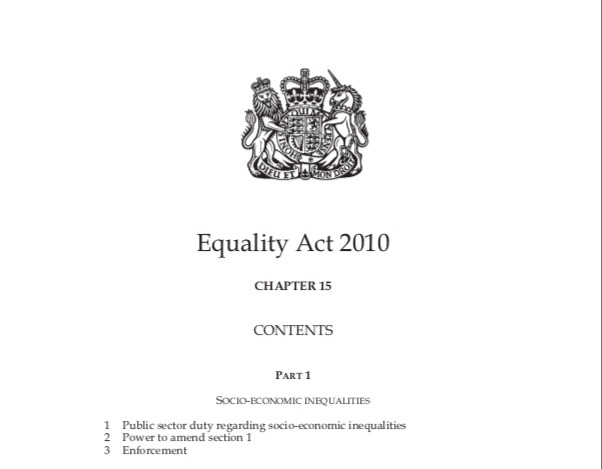Is the Equality Act 2010 sufficient at present?
In answering this question I would normally have said yes. It encompasses the range of groups who require additional protection e.g. race, disability, gender reassignment and sex etc. However, that is no longer as straightforward as it should be. Nowadays organisations and public authorities regularly amend the ‘protected characteristics’ by renaming and interpreting them to mean another thing. It’s almost common practice now to see ‘gender’ being used instead of ‘sex’ and ‘gender identity’ rather than ‘gender reassignment’. These changes are not a simple case of just using an alternative word, instead they fundamentally change the level of protection for all those people who fall within either of those groups.
So I would have to answer NO. The Equality Act 2010 is no longer able to protect those groups of people who require additional protection. The regular misuse of the Equality Act 2010 has now rendered it insufficient and people are suffering as a consequence of that.
It is absolutely crucial that our public authorities strictly apply the correct terms as defined within the Act. Isn’t it obvious to everybody that when they use a different word – a word that has a different definition – will result in less protections for that group?

Sex and Gender do not mean the same thing.
Understandably people have been writing to their local Councils and highlighting this very point. Many have had success in their letter writing, with Councils amending their wording to reflect the correct terminology as used in the legislation. However, more recently there has been a further disturbing development. COSLA, the voice of Local Government in Scotland would appear to be now involved. We have discovered that a number of different Councils are using very similar wording within their responses. Who else would Councils take advice from on how to answer these pesky letter writers? What other central body exists that communicates with every Local Authority in Scotland?
So what are these Councils now saying to those people (women) who are expressing concern that the group of protected characteristics they belong to are being wrongly interpreted and therefore diminishing the level of protection they are entitled to?
East Lothian Council responded to one such request as follows.

(This response is particularly revealing as it cites Stonewall Scotland as being a reason why they use ‘gender’ instead of ‘sex’. Are our Local Authorities really deferring to a charity rather than what’s written in the legislation?)
Thanks to this Twitter account who shared the following responses received from Orkney Council and Highland Council, we can see that they have used the same wording as East Lothian Council.


How bizarre is it that these three Councils have all responded in almost identical ways to these enquiries about Protected Characteristics. Has ‘the voice of Local Government in Scotland’ COSLA perhaps circulated advice to them on this matter?
“COSLA and My Job Scotland use the term “gender” in equalities monitoring and other documents because we believe it leads to more accurate data being collected which helps us to better protect people who are likely to experience inequalities. We recognise that the Equality Act 2010 refers to ‘sex’ but this is the legislative minimum standard. We do not believe that using the term ‘gender’ compromises the legal protections afforded to women and girls and men and boys. In common with other public sector bodies in Scotland we understand that a binary definition can be problematic for some people and so on our equalities monitoring form we have a non-binary question that allows people to self define if necessary. “
COSLA, are these your words?
Have you circulated them to Local Authorities all across Scotland?
Why have you decided to use the term ‘gender’ rather than ‘sex’?
Why are you moving towards a non-binary definition?
Was this decision taken by yourselves or did instructions come down from representatives within the Scottish Government?
I have 5 Campaign Aims and rectifying the legalities of policies is one of them.
Follow me on Twitter SusanSinclair@Scottish_Women
Follow me on Facebook “Scottish Women”
You can read my other blogs at http://www.Scottish-Women.com
